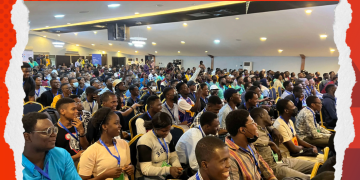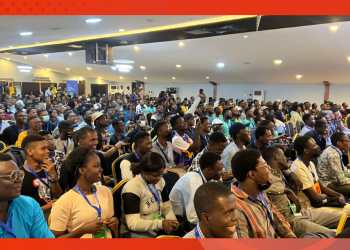The Aeonian Project, announced this week by Synectics Technologies and Schneider Electric, will transform the 600MW Karuma Hydropower Plant into Africa’s most advanced AI facility. The $720 million project targets a 2026 launch, directly challenging the current reality where 98% of African data gets processed overseas.
Uganda Taps Surplus Energy to Build Continental AI Hub
The project centers around USIO, a 10MW sovereign supercomputer built with NVIDIA’s latest GB300 Blackwell GPU platform. USIO meaning “infinite” in Swahili will draw power from Uganda’s massive Karuma Hydropower Plant, which generates 600MW through six vertical Francis turbines positioned along the Victoria Nile.
“By digitalizing clean energy through best-in-class infrastructure, we are empowering Africa to control its data backbone responsibly, sustainably, and sovereignly,” said Oladele Oyekunle, Executive Vice Chairman and CEO of Synectics Technologies.
The facility runs entirely on renewable energy, using natural river water for cooling and modular heat recycling technologies. Two dedicated fiber optic cables will connect the supercomputer to Kampala headquarters and international submarine cables through Kenya and Tanzania, ensuring both local control and global connectivity.
African Companies Can Finally Build AI Models at Home
The Aeonian Project addresses a critical gap that has kept African innovation dependent on foreign infrastructure. Currently, African researchers and companies must rely on overseas servers to train AI models, creating delays, higher costs, and potential data security concerns.
USIO will enable African institutions to develop AI applications in local languages, trained on African datasets that reflect regional priorities and cultural contexts. The supercomputer targets healthcare, life sciences, education, and research applications specifically designed for continental needs.
“In the same way gold and oil once shaped economies, digital tokens will shape the next era of innovation. Africa must not just mine data, but also mint intelligence,” explained Niels Van Rees, Co-Founder of MDCS.AI, a key project partner.
Modular Design Enables Expansion Across East Africa
The Aeonian Project uses a modular approach, structuring its 100MW capacity into six independent 15MW modules (KRM1-KRM6) plus the 10MW supercomputer. Phase one launches with one 15MW module and the full supercomputer in late 2026, reaching full capacity by 2027.
Schneider Electric’s EcoStruxure platform will manage power, cooling, and IT operations across all modules, targeting ambitious efficiency benchmarks including Power Usage Effectiveness (PUE) below 1.2 and Water Usage Effectiveness (WUE) below 1.1.
“The Aeonian Project is a bold step toward Africa’s digital sovereignty, and we are proud to support it with Schneider Electric’s smart infrastructure solutions,” said Ifeanyi Odoh, Country President for Schneider Electric East Africa.
Skills Development Program will Build Local AI Talent
Beyond hardware, the project includes the Synectics Center for Artificial Intelligence and Innovation, an AI Center of Excellence focused on developing local talent. The center will collaborate with NVIDIA, MDCS.AI, and international partners to ensure Africa builds both sovereign AI capacity and the human expertise to sustain it.
This educational component addresses another critical challenge. Africa’s need for homegrown AI specialists who understand local contexts and can develop culturally relevant solutions.
The facility will offer colocation services, blockchain hosting, data storage, cloud computing, AI model training, on-demand computing services, and disaster recovery for regional data centers.
Strategic Location Connects Landlocked Nations to Global Networks
Uganda’s position as a landlocked nation might seem disadvantageous for a continental AI hub, but the project’s connectivity strategy turns geography into an advantage. The 2,500km Apeiron fiber optic network will link Uganda’s data corridors to submarine cable landing points in both Kenya and Tanzania.
This dual connectivity provides redundancy and positions the facility to serve other landlocked East African nations, potentially extending AI services across the region through terrestrial fiber connections.
The Karuma location also benefits from political stability, strong government support, and abundant renewable energy, three factors essential for long-term AI infrastructure success.
Environmental Sustainability Meets Digital Ambition
The project’s environmental credentials set it apart from traditional data centers that rely on grid electricity and energy-intensive cooling systems. The facility avoids transmission losses while utilizing 100% renewable energy.
Natural river cooling from the Victoria Nile eliminates the need for energy-intensive air conditioning systems, while modular heat recycling technologies will capture waste heat for productive uses.
This green approach positions the Aeonian Project as a model for sustainable AI infrastructure across Africa, where abundant renewable energy resources remain underutilized.
Uganda’s sovereign supercomputer could become the foundation for an entirely African-controlled intelligence economy.
With construction targeting 2026 completion, the Aeonian Project will soon test whether Africa can successfully compete in the global AI race while maintaining environmental sustainability and data sovereignty.














